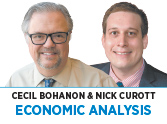Subscriber Benefit
As a subscriber you can listen to articles at work, in the car, or while you work out. Subscribe Now For the last few years, the world has watched the Venezuelan economy melt down. This column reported in 2016 on a slew of 747 jets landing in Caracas. No, they didn’t deliver food, medicines or disposable diapers. The planes were loaded with Venezuelan bank notes. The annual rate of inflation was then at 181 percent.
For the last few years, the world has watched the Venezuelan economy melt down. This column reported in 2016 on a slew of 747 jets landing in Caracas. No, they didn’t deliver food, medicines or disposable diapers. The planes were loaded with Venezuelan bank notes. The annual rate of inflation was then at 181 percent.
In 2017, we reported the military had taken command of food distribution to ensure “fairness.” Meanwhile, down in the weeds, pork production had declined 71 percent from the previous year. Not unrelated, the average Venezuelan had lost 20 pounds since 2016. In 2018, we reported the annual inflation rate was over 18,000 percent, infant mortality was up 30 percent, and 90 percent of the population was food-insecure.
What went wrong? Here is our take: a price system made dysfunctional by policies socialist regimes are prone to adopt, but also detrimental if adopted by non-socialist governments.
The Chavez regime came to power in 1998 in Venezuela with a promise to both help the poor, and respect private-property rights and free markets. In his victory speech, Chavez took a moderate tone, extolling the “joys of prudent free-market economics.”
However, over the next 20 years, Chavez and his successor, Nicolas Maduro, expanded and politicized welfare programs, nationalized large portions of the economy, and imposed draconian price controls on consumer products. When the regime ran out of revenue, it pulled one of the oldest tricks in the book: print money to finance spending. The results: widespread price inflation.
Going back to the weeds of 2017: The Venezuelan pig farmer could not charge higher prices for pork because of price ceilings. If he did, his farm got confiscated. Yet his costs continued to skyrocket because of inflation and rampant shortages. Pig farmers went out of business. Ditto in other sectors. The regime’s response: Double-down with more price controls and money printing. That led to 2019’s predictable outcome: hyperinflation and mass malnutrition as economic activity grinds to a halt.
We suspect politicians touting the benefits of socialism are exceedingly prone to follow this path. After all, if the economy is to be in the hands of the state, why would the government respect private property, free prices or monetary stability? However, a regime need not be expressly socialist to generate these results. Print up money, confiscate private property and impose price controls and you, too, can make your economy a basket case—in the name of any ideology you choose.•
__________
Bohanon and Curott are professors of economics at Ball State University. Send comments to [email protected].
Please enable JavaScript to view this content.
